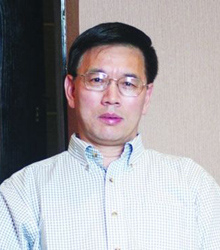| IMF's New Secretary
 |
|
(FILE) |
Lin Jianhai was named the secretary of the International Monetary Fund (IMF) by its managing director Christine Lagarde on March 7.
The appointment will take effect on March 22 and Lin will be the first Chinese to lead the Secretary's Department of the Washington D.C.-based global institution.
This is the second time the IMF chose a Chinese economist as its senior official. In July 2011, Zhu Min was named deputy managing director of the organization.
"Lin has had a wide-ranging Fund career in both country and policy work. This breadth of experience has been of particular benefit to the IMF, where Lin's skill in building consensus among staff, management and our global membership has been essential for the productive work of the executive board during one of the most challenging periods in the Fund's history," said Lagarde.
Lin was born in Wenzhou, east China's Zhejiang Province, in 1955 and studied at the University of International Business and Economics in Beijing and the University of California, Berkeley. He holds a doctorate in international finance from George Washington University. Lin has been acting director of the Secretary's Department since November 2011. Before coming to the IMF in 1989, he worked in the financial sector and academia.
China's consumer price index (CPI), a barometer of inflation, climbed 3.2 percent year on year in February, according to data from the National Bureau of Statistics.
The growth, down from 4.5 percent in January, hit the lowest level in 20 months, providing more room for the government to stimulate growth.
The February CPI marks the end of the "negative deposit rate" era that had existed since February 2010, as the inflation rate finally fell below the one-year deposit rate of 3.5 percent.
For the first time in a year, China recorded a trade deficit of $31.48 billion in February, the largest in a decade, as import growth far outpaced exports.
Exports rose 18.4 percent from a year earlier to $114.47 billion in February, while imports were up 39.6 percent to $145.96 billion, according to data from the General Administration of Customs.
Liu Ligang, head of Greater China Economics, ANZ Banking Group, was cautiously optimistic about the country's export outlook this year, saying export growth may rally, buttressed by the government's supportive policies and stabilizing external conditions.
"The trade data, along with a slew of other indicators announced previously, suggests the world's second largest economy is heading for a soft landing," he said.
China will change three members of the central bank's monetary policy committee, according to the State Council on March 14.
The State Council has approved the appointment of Qian Yingyi, Chen Yulu and Song Guoqing as new members of the monetary policy committee of the People's Bank of China.
Qian is currently Dean of the School of Economics and Management with Tsinghua University. Chen is President of Renmin University of China, and Song is a professor of the National School of Development of Peking University.
Meanwhile, Zhou Qiren, Xia Bin and Li Daokui will no longer be members of the committee.
The committee was established in 1997, tasked with advising on the country's monetary policies. There are currently 15 committee members, including central bank officials, economists, ministers from other government departments and economists.
Japan announced on March 13 that it has won Chinese approval to buy 65 billion yuan ($10.3 billion) of Chinese government bonds.
The move will help Japan diversify its foreign exchange reserves away from the U.S. dollar and strengthen ties between the two Asian economic powers.
"We will consider trends in the financial markets to decide on a right time for the purchases," said Jun Azumi, Finance Minister of Japan.
He also suggested the initial purchases would be in small amounts and take into account conditions in Japan's foreign-currency assets.
Lian Ping, an economist with Bank of Communications, said the move shows China is increasingly opening up its bond market to global investors.
Vehicle sales in China rose 24.5 percent year on year to reach 1.57 million units in February, said the China Association of Automobile Manufacturers. The output was 1.61 million units, surging 28.5 percent.
However, the total sales for the first two months dropped 6 percent from a year ago to 2.95 million units, while output declined 4.9 percent to 2.9 million units.
The performance was dragged down by slack sales in January, as most Chinese worked fewer days in January as a result of the week-long Spring Festival holiday (January 22-28).
China is the world's largest auto market, with last year's automobile sales reaching 18.50 million units and output topping 18.42 million units.
The 2012 China Qinghai Green Economy Investment and Trade Fair will be held on June 10-13 in Xining, capital of northwest China's Qinghai Province.
The annual fair serves as a platform to attract investment and facilitate the green economy. In the past 12 years, the fair witnessed a total of 2,313 investment deals worth 457.2 billion yuan ($72.57 billion).
"Looking ahead, the province will step up a clampdown on highly polluting and energy-depleting projects," said Wu Haikun, Director of Qinghai Economic and Trade Commission. "In addition, more vigorous efforts will be made to propel development of new energies, new materials and information technology." | 